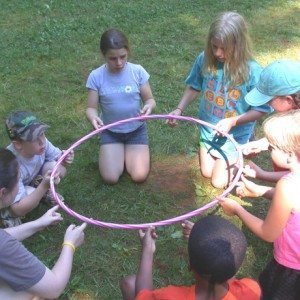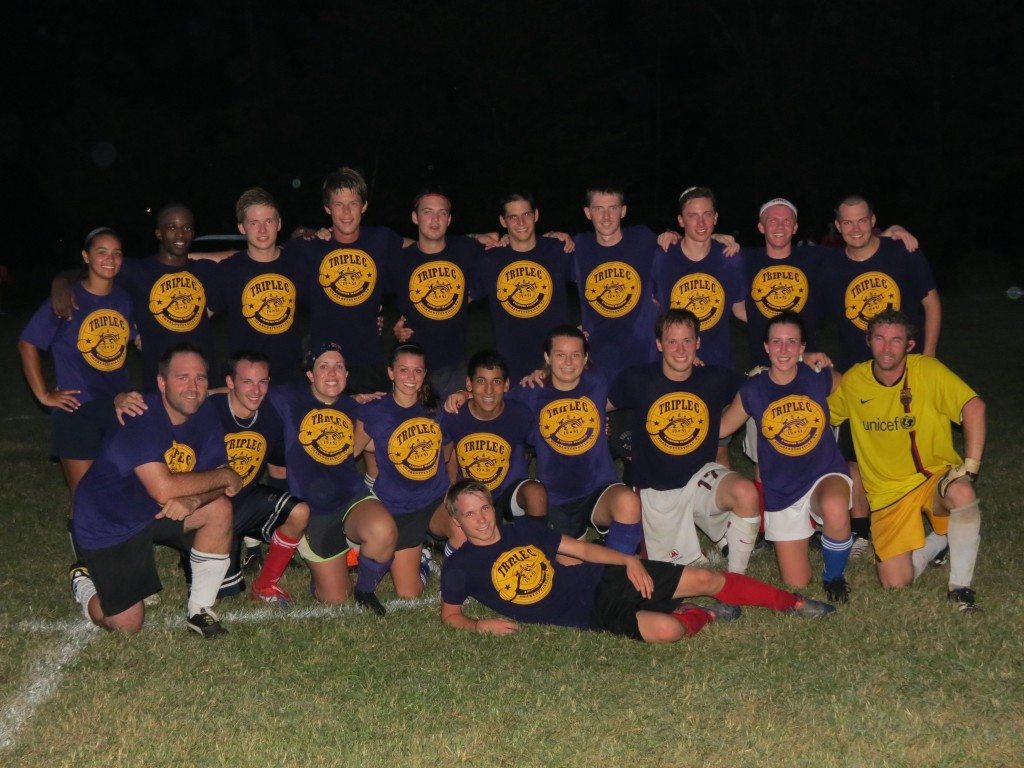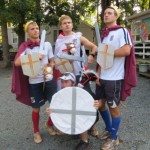Category: child development
Developing a Sense of Identity at Camp
Take ten seconds and think about how you would describe who you are to someone that you have just met. As adults, most of us will talk about what we do (our role at work) to describe who we are. “I’m an electrician” or “I teach first grade.” We identify with what we do and as adults spending 40+ hours a week at work, we tend to identify with our roles on the job (Arnett, 2004). It’s the same for stay at home parents. Many will identify themselves as just that. If work is our main source of identity as adults, what do children have to point to as their identity? Recreation can answer that question and help children have a strong understanding of who they are.
At Triple C Camp, we see hundreds of children come through our programs every year. One trait we consistently see in campers is an ongoing development of sense of identity. Identity is a sense of who one is and how one contributes to society (Sokol, 2009). Identity is being developed in many ways at camp. Camp fosters this development by providing quality recreational experiences as a springboard for identity formation. Next time you’re at camp, take a look around and see what’s going on. From a distance, it looks like kids playing and having fun. Look a little deeper. Sure, recreation is happening all over camp. There is more going on though. Campers are examining what peers are doing, looking for reactions from adults, acquiring new skills, finding a social group to fit in to, expressing themselves, “trying on” different personalities, and learning values. In short, campers are discovering who they are through intentionally designed recreational experiences.
Recreational experiences, combined with feedback and validation from counselors and peers help campers to make this discovery. At Triple C Camp, activities are facilitated and scheduled in a way to give campers a small sampling of a multitude of engaging recreational pursuits so campers can figure out what they like to do and in turn, figure out who they want to be. These activities are coupled with down time where counselors have a chance to talk to campers and praise their effort, sportsmanship, adherence to the rules, etc., to give them the validation they seek in building an identity based on the activities they enjoy. Hearing another camper in their group say that they are really smart when it comes to science experiments or having a counselor tell them they are a natural leader in a basketball game can spark a passion within them that can lead to lifelong hobbies that become a large part of their identity.
Here is a list of some of the great identity-forming recreational activities we offer at Triple C:
Physical Sciences Archery Reptiles Cricket Rock climbing
Horseback Riding Swimming Music Volleyball Natural Sciences
Hiking Drama Gardening Paddling Tennis Outdoor Skills Karate
What will your camper become this summer at Triple C Camp?
References
Arnett, J. J. (2004). Emerging adulthood: The winding road from the late teens through the twenties.
New York: Oxford University Press.
Sokol, J. T. (2009). Identity development throughout the lifetime: an examination of Eriksonian theory.
Graduate Journal of Counseling Psychology, 1(2), 14.
SUMMER CAMP HAS ARRIVED
By: “H” Rothenberg Co Owner & Director 6/7/14
As a camp director, I often get asked, “What do you do the rest of the year?” I normally respond with, “We operate groups year round on our ropes course and offer nature and science programs to School and Scout groups.” However, what we do most is spend nine months preparing for three. That to me is an amazing statistic. Where else in the world do you spend nine months preparing for three? Not even in pro sports does that ratio come into play.
During the “off season” we spend time promoting camp, marketing to and recruiting campers. Improving the property which this winter included paving Camp Road. We also give about 100 tours. We interview, check references and hire staff as a big part of our preparations. We even go to many of our summer campers sporting events, plays, and community happenings. All part of preparing for these magical three months. We have been pretty fortunate that over the last 15 years we have lived on the grounds of Triple C Camp and even taken some great vacations during the months of November & December when our camp families and staff are not as interested or engaged in thinking camp.

We are also fortunate that we have time to volunteer. Libby has been a dedicated volunteer to the Scouting Movement. First, she was our daughters Troop Leader and Service Unit Coordinator for the Monticello region of Virginia Girl Scouts. The last several years she has been the Program Coordinator for our sons Boy Scout Troop. My volunteer work used to be on the basketball court as I help found VABA’s Developmental Basketball League. The last couple of years I have been serving the American Camp Association as the Professional Development Chair for The Virginias which hosts three conferences a year with about 125 people at each conference. Also, during this time, Libby will enjoy reading a book on the beach and I definitely enjoy time on the golf course with the quest to obtain the perfect golf shot. This too is preparation for the three months of summer.
Well, those three months this year have been shortened just a little bit due to old man winter. However, now the time has come. This Monday (June 9) we will have over 100 campers in camp. Our returning staff will be working with those campers while our first year staff members (and a few returners) will be in staff training. The following week we will be closer to our average of 275 campers. Staff training for me is the most important week of the year. All the conferences we attend, the trainings, the reviewing of the cutting edge child development strategies all come down to this critical week of training. Of course one of things I’ve learned this year is that training doesn’t take place just during training week, we are training the staff all summer long in our daily morning meetings and our two in services we schedule each summer.
The past two weeks have been filled with Life Guard Training, Ropes Course Training, preparing the camp grounds, International Staff arriving, and other preparations for the greatest summer ever! Now, the time has come. The fences are painted, the grass is cut, the green is on the trees and our Leadership Team is prepared for the summer of 2014. A lot goes into preparing for a summer. However, it does not compare to the summer itself.

This summer we will average about 275 campers a week and 70 staff who will grow and develop our campers through the activities we offer. Many people look at summer day camp as child care. Our focus has always been to train our staff to develop each individual child. Each year we look for new and innovative ways for staff to connect with the campers and peel back the layers of each child to help them grow into better young people and specifically more responsible and confident young adults. Every child has some thing to offer. Something special that the staff can make a connection and lead them toward a great path.
This summer we have “GUIDE” on the back our Staff members shirts that they will wear each Monday. We hope that our staff recognize their role as a guide through this experience. Parents are giving the most prescious thing in their lives to us… their child. We must guide the children toward the goal of taking steps to become a better friend, and growth and development of the whole person. This is a responsibility we do not take lightly. If you have an extra few moments this summer, please make the effort to be a GUIDE to someone in your life. Whether it be a child or a peer. The opportunity will be there. You have great gifts to share, please share them with those around you.
Here at camp, we will be busy with buses, activities, food service, staff soccer matches, flag ceremonies, and so much more. Please come by and visit us some time and see the magic of camp in action. There is plenty to see during our three months that are not to be missed. Come be part of the action, and help Guide to “MAKE IT A GREAT ONE!”

International staff at camp
By “H” Rothenberg Co-Owner/Director
Overnight camps have a long standing history of hiring international staff. Back in “the old days” International staff came to the U.S. to hang out with some kids, work a little bit, party a little bit and sometimes would even go up to Canada, then reenter the U.S. with a new visa. Easy Peasy. Not such the case anymore.
 Today, they have to pay several hundred dollars in program fees to a company to help organize a visa. They must make an appointment sometimes a thousand miles from their home at an U.S. embassy, they must be excepted into the program and they must leave the country on a designated date. If any of these procedures are not adhered to, they get red flagged and may not be able to come back into the U.S….ever!
Today, they have to pay several hundred dollars in program fees to a company to help organize a visa. They must make an appointment sometimes a thousand miles from their home at an U.S. embassy, they must be excepted into the program and they must leave the country on a designated date. If any of these procedures are not adhered to, they get red flagged and may not be able to come back into the U.S….ever!
Then there is the camp side of things. We have a relationship with a U.S. placement coordinator. We review applications, we interview prospective staff members on the phone or skype. We have many levels of follow up interview questions, references, back ground checks, etc. We pay the agency a fee for the staff member and a sevis fee. It is all pretty complicated and as a camp, we MUST provide room and board. All just for international staff??
ABSOLUTELY! One of the greatest joys is seeing the friendships and long lasting relationships that develop amongst our staff. Most far outlast the summer. Some have even gotten engaged and married. We also have many staff that return year after year from England, South Africa, Australia, Russia, etc. It’s one thing when a staff member who grew up in Charlottesville returns for two or three years, however this summer will be Skooby’s sixth summer. Pretty special. She has become another daughter for me and Libby and an amazing big sister to so many of our campers. This year Loz from OZ will also be returning for her fourth summer after taking last year off she will be back. Travis Yuille is on his fourth year from South Africa. We also have 2nd and 3rd year barn staff from Australia (Kasey & Sasha) and Ben W. & Benny P. on their third years from England! It amazes me.

 The camp really benefits. Not only do our campers get to learn about different accents, cultures, experiences, etc. we learn games from other countries like netball, cricket and touch rugby. Our international staff are the backbone of our camp and are so dedicated and committed to our campers, it is very special.
The camp really benefits. Not only do our campers get to learn about different accents, cultures, experiences, etc. we learn games from other countries like netball, cricket and touch rugby. Our international staff are the backbone of our camp and are so dedicated and committed to our campers, it is very special.
Another special aspect is the way our camp families and staff open their hearts and their homes to our international staff. Many invitations for dinner at an American home is a big deal for our staff from over seas. The average age of our international staff is 24 years old and they really want to learn about American Culture. On many occasions, our American staff’s families have invited many staff to their home to meet their extended families. All around pretty fantastic.
I could not imagine TRIPLE C CAMP without our international staff. Now in our fifteenth summer, they have become a staple of our camp and we have hundreds of friends around the world that we would not have otherwise. We look forward to this summer with great joy to work with the children, and to welcome our friends from over seas for another fabulous experience!
Child Care vs. Child Development
By: “H” Rothenberg Triple C Camp Co-Owner and Director
When we bought Triple C Camp in 1999, Libby and I realized that a day camp is very different than the overnight camps we used to direct in the midwest.
Day camp has many of the same activities, facilities, philosophies and fun as overnight camp….however we felt this was going to be a bit different. Now, we have owned Triple C for 15 years, and I liken day camp to the wind sprint and overnight camp to the marathon. Both are running, however very different. Training is different, the participants are different, the fees are different staff’s complete focus is different and even the landscape is often very different.
Another major difference is the vision for the parents. We hear from parents on the phone all the time that say, “I need five or six weeks of child care this summer.” This always leaves a distaste in my mouth as we look at our program as child development. However we do understand the perspective of the parent and they are at work. Their children are not at school and need “coverage”. This is another buzz word I dislike. So, we try to educate. We have lengthy phone conversations with camp parents, we give extensive tours of our property to families, we hold open houses and have trained staff present. All this time effort and energy to show people that our focus is to partner with them to help raise and develop their child. We want it to be a partnership. We want to work with them to help them grow grow their child, not just care for them.
![sign_to_day_camp_color[1]](http://tripleccamp.vibethink.net/wp-content/uploads/2014/03/sign_to_day_camp_color1-350x250.jpg) In the state of Virginia, child care licensing REQUIRES day camps to become licensed. This is very reasonable for a camp like ours. All the procedures are put into place for child care centers. and we are a child development program personified! So, when the licensing staff from the county come to us, they are so appreciative of how organized and ready we are for them. Truth is the American Camp Associations standards are much higher and more difficult and every camp Libby and I have ever been to that was ACA accredited never received lower than 100%. Making sure the ducks are in a row and procedures are followed are key to a great child development program. This is one of the things American Camp Association specializes in. We have been members of the ACA for over 20 years and believe in it’s core values.
In the state of Virginia, child care licensing REQUIRES day camps to become licensed. This is very reasonable for a camp like ours. All the procedures are put into place for child care centers. and we are a child development program personified! So, when the licensing staff from the county come to us, they are so appreciative of how organized and ready we are for them. Truth is the American Camp Associations standards are much higher and more difficult and every camp Libby and I have ever been to that was ACA accredited never received lower than 100%. Making sure the ducks are in a row and procedures are followed are key to a great child development program. This is one of the things American Camp Association specializes in. We have been members of the ACA for over 20 years and believe in it’s core values.
Training staff is a bit different as our staff in day camp recognize that the children go home each day and we train them accordingly. We spend a full week with staff(similar in most overnight camps) talking about the expectations of what campers will be like and the staffs interaction with them. Since the children go home daily, we are unaware of what the children are eating, how much sleep they are getting, what influences they have, etc. We rely on proactive communication from parents to partner with us about their children.
That is really the key! PARTNERING with parents to help raise their children. This is similar in overnight and day camp, however in day camp it is more prominent on a day to day basis. To get maximum growth from the children it is critical that families share information with the camp, and that the camp shares that information with the child’s Counselor. Once we know what is going on with a child we have a much better chance of success regarding their growth and development. Of course, we always learn about the parents and the families when they are sharing, or not sharing info. as well.
Whether you are sending your child to day camp, or overnight camp, please visit the camp, meet the Directors, find out where the staff come from and how they are trained. Find out about health care, age of staff, backgrounds of staff and so many other things that will help you find the best PARTNER for working with you to help grow and develop your child.
Preparing for Summer Camp
By: “H” Rothenberg Triple C Camp Co-Owner and Director
Now that you have chosen the right summer camp for your child, it is time to prepare for a wonderful summer full of fun, new friends and exciting experiences. Whether this is your child’s first time attending a summer camp or she/he is a seasoned veteran, preparation is important for a positive camp experience. To help your child have a successful time at camp this summer…
1. Make plans for a visit to the camp with your child, especially if she’s/he’s anxious about going to camp. If visiting isn’t an option, then spend time browsing through the brochures and/or visit the camp’s Web site to get a feeling for the camp, cabins and facilities.
2. Consider arranging for a first-time camper to attend with a close friend or relative. For overnight camps it is best if the buddy is close in age, so they can room together in the same cabin.
3. Begin packing several weeks in advance to avoid last minute shopping trips or scrambles to find that ‘must-have’ favorite shirt. Most sleep-away camps will send a packing checklist to get you started. When packing for summer camp, be sure to:
- Familiarize yourself with any camp regulations regarding food and money
- Put your child’s FIRST & LAST name in all clothing with a laundry marker and make sure she/he helps you pack, so she/he knows what they are bringing
- Include plastic bags or a laundry bag for wet or dirty clothing
- Encourage your child to pack a favorite picture or stuffed animal as a reminder of home
- Tuck in some stamped envelopes or pre-addressed postcards
4. Don’t buy a brand-new wardrobe. While one or two new items are fine, camp life can be a bit rough on clothing. Children, especially first-timers, will also find “old favorites” reassuring when away from home.
5. Spend time talking to your child about what camp will be like and listen to any fears and concerns. Remind your child that apprehension and homesickness are perfectly normal feelings.
6. Fear of the unknown is usually the biggest worry for children attending camp, so time spent at home “practicing” a typical day at camp may provide some reassurance and self-confidence. Be sure to practice anything which your child may need to know but not be used to, from doing laundry to walking after dark with a flashlight.
7. Send a letter to your child at camp before camp begins so that she/he will have a letter waiting for her/him on that first, very important day. Make sure you mention what a fantastic time they will have at camp and how proud you are of them.
8. Look into your camp’s phone call regulations and discuss them with your child. If the camp has a no phone calls policy, then honor it and make sure your child also understands this policy. If you do plan to make calls, then reach an agreement ahead of time with your child on when and how often.
9. Cell phones: Most camps are a no cell phone area for campers. This is a great growing opportunity away from the family. Support the camps policy and leave cell phones at home. As for other electronics, many camps will allow campers to utilize electronics while on their bed during rest time, or for a few minutes before going to sleep. However, there is a risk in bringing valuable items away from home. My suggestion would be to bring an older model that if it gets broken or misplaced there will not be as many tears.
10. Care packages can be the highlight of your child’s day when at camp, but think smart when putting one together. Check with the camp regarding guidelines on food as many do not allow it. If you do send food, be sure to include enough for everyone in the cabin! Other items which are easily shared with cabin mates include games, cards, Mad-Lib books, etc. Other good care package goodies include a disposable camera, journal, address book, water bottle, or a t-shirt or pillowcase for autographs.
11. Be realistic. Like the rest of life, camp will probably have its high and low points. Make sure your child does not feel pressured to succeed at camp, and remind her/him that the main purpose of camp is to relax and have fun, learn new skills and to make friends.
If anyone would like to have personal contact for camp advice, I can be reached anytime
434.2932.2529 or [email protected]
Yours in camping,
“H” Rothenberg




